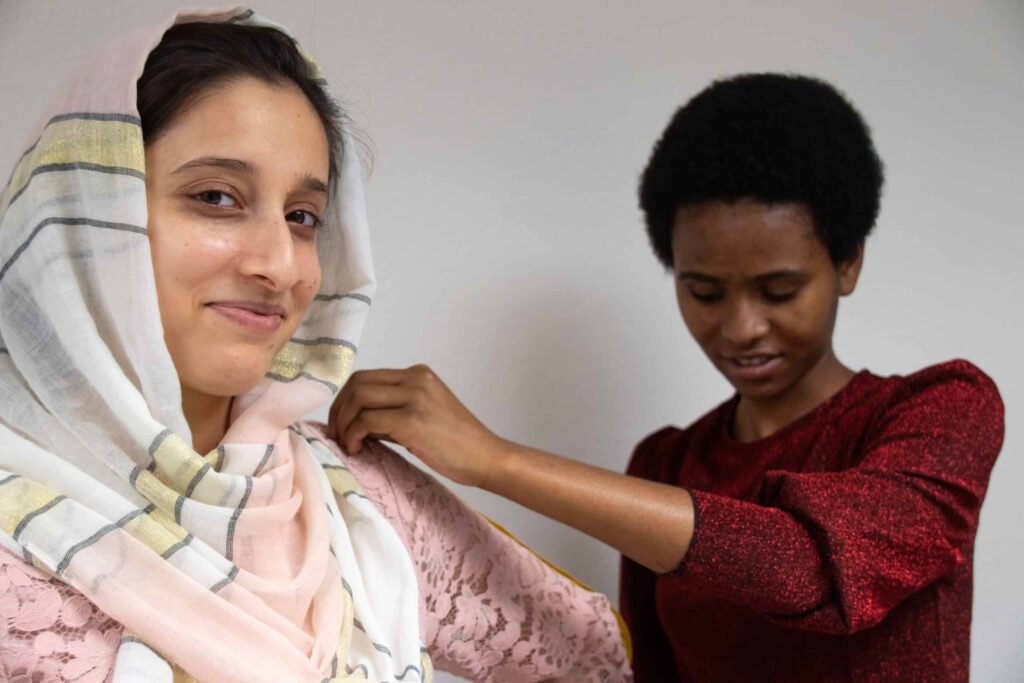

Women’s empowerment aims to give women agency and decision-making power over their own lives, instill in them essential values that they may have been deprived of, and ensure their right to affect social change for themselves and others.
To understand the need for women’s empowerment, one must understand the oppression that many women refugees and migrants are fleeing.
More than 380 million women and girls live in extreme poverty worldwide. That’s more than the entire population of the United States living on less than $1.90 a day. Poverty is especially impactful for women because they lack the same opportunities as men to pursue an education, work, and own property. Worldwide, 12 million girls under the age of 18 are married each year. Worldwide, 130 million girls are out of school. (Global Citizen website)
In the Democratic Republic of the Congo, 52% of women report being victims of domestic violence and 39% of Congolese women have been threatened or harmed. UNICEF estimates that 48.1% of adult women in the Democratic Republic of the Congo are illiterate. (UN Women)
In Afghanistan, women are prohibited from traveling long distances without a male escort, must cover their faces in public, and are instructed to stay at home except in emergencies. The literacy rate for Afghan women is estimated at 29.8 percent, and is even lower for rural women. (UNESCO) Currently, 80 percent of Afghan girls of school age do not attend school. About 30 percent of Afghan girls never receive a primary education. Girls cannot attend school beyond the sixth grade, and the education ban extends to university. Women are barred from public places, including parks, and from most forms of employment. (AP News)
In Syria, women’s labor force participation rate is just 14%, compared to 76% for men. Approximately 6 million people in Syria are in dire need of nutritional assistance, of which 74% are women and girls. Female-headed households are twice as likely to report being unable to fully meet their basic needs as male-headed households. (UN Human Rights)
1.1 million girls between the ages of 15 and 19 have experienced sexual or other forms of violence. Latin America and the Caribbean has the second highest teen pregnancy rate in the world, with 63.1 live births per 1,000 births among 15-19 year olds. Maternal mortality is the leading cause of death for women aged 15-24. (UNICEF)
In addition to the challenges faced by all refugees and migrants who come through World Relief, women face a range of additional hurdles: They are more likely to be extremely isolated; They may not be able to read or write in their native language; Their dress style may be conspicuous and attract unwanted attention; Many of the women who come through World Relief are the primary caregivers for large numbers of children; They have never worked outside the home, ridden public transport or even left the house alone on a regular basis.
In addition to standard resettlement and case management services, World Relief Spokane aims to address the specific needs of its female clients by creating a safe space for them to interact with other newly arrived immigrants and by offering classes tailored to their personally expressed specific needs.
Led by manager Melissa Stipek, the Friendship Center seeks to meet the social needs of its clients, especially women, by creating a safe, welcoming place of belonging. In addition to regular events like children’s field trips, tea parties and baby showers, the Friendship Center also allows people to drop in looking for help with a variety of needs. Community ambassadors speak a variety of languages and are available to help visitors resolve problems or connect them to additional resources.
The Educational Service Center provides extensive cultural orientation to World Relief clients by designing and implementing needs-based plans and programs to equip them with the knowledge, skills and attitudes they need to adapt to their new lives and become independent.
Basic Computer Skills – From how to use a mouse to how to search the internet to how to help children with their homework, women learn how to operate a computer and receive a free laptop. Conversation Club – Women practice English related to the subjects they need most. Drivers Education – Women receive written and practical driving instruction. Textile Arts & Entrepreneurship – They learn sewing techniques and how to start a home business to contribute to the household income. Mental Health Workshops – Working with trained professionals, these workshops teach helpful techniques for self-care and how to identify when women need additional professional help.
World Relief Spokane staff is committed to providing a safe and welcoming space for women to come together, build friendships, learn skills, and become empowered. But as we all know, it takes community. Mature women with life experience are especially needed as friends and mentors. Apply to volunteer and join this worthwhile work.
Tara Thomas Agency stands at the forefront of the entertainment industry, with years of experience dedicated to nurturing the most exceptional talents and successful acts.